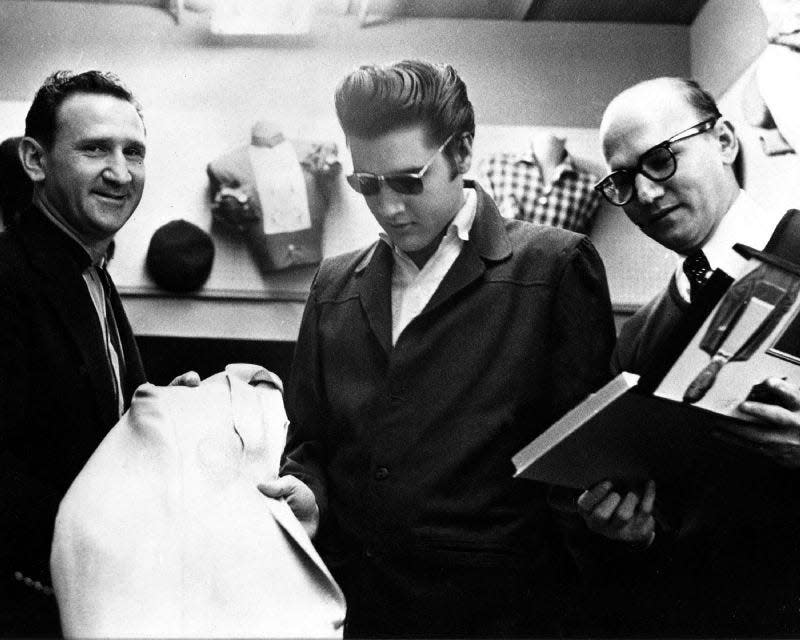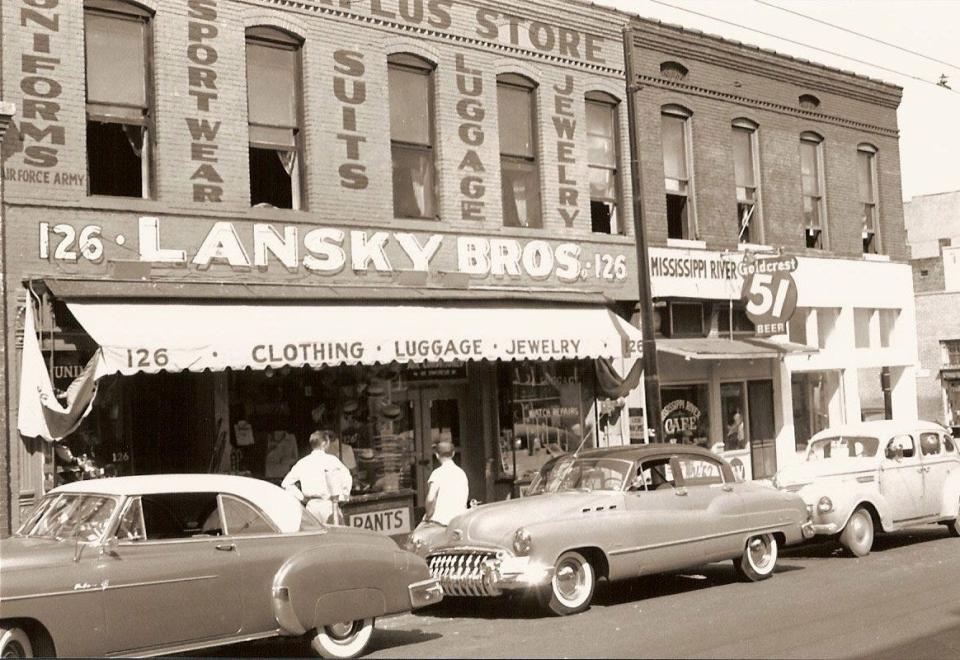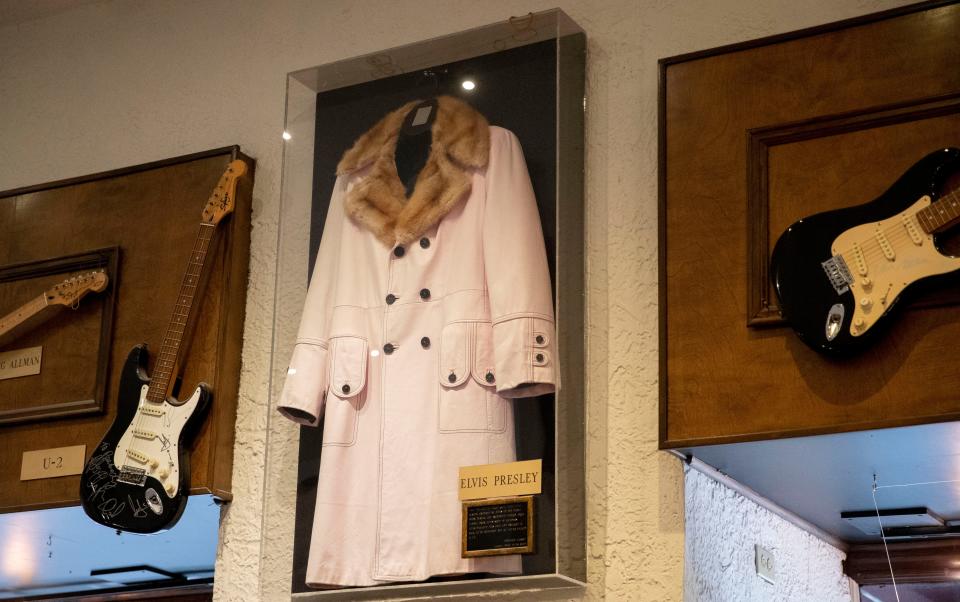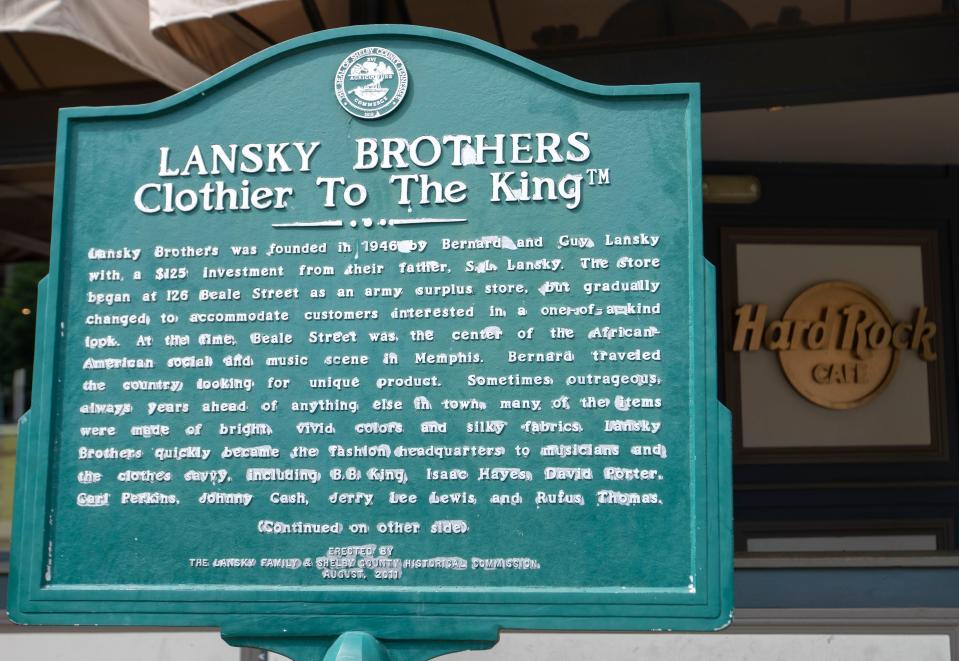From Elvis to Oscar: The story of Lansky Brothers and its place in Memphis history
When the 95th Academy Awards ceremony takes place Sunday night, director Baz Luhrmann’s biographical motion picture about you-know-who — OK, it’s “Elvis” — could collect eight trophies.
The movie’s Oscar nominations include Best Picture, Best Director and Best Actor, to name only the three most prominent.
A less-publicized category in which "Elvis" is likely to prevail, according to prognosticators at the two major journals of the entertainment industry, Variety and the Hollywood Reporter, is Costume Design. Nominee Catherine Martin already has Costume Oscars for two other movies directed by Luhrmann, "Moulin Rouge!" and "The Great Gatsby."
If she wins, she’ll no doubt thank her director, who is also her husband. But will she also thank one of her sources of inspiration on this project, the Lansky Brothers?

Guy and Bernard Lansky, better known as the Lansky Brothers, with a capital B (like the Marx Brothers, the Allman Brothers and the Jonas Brothers), became world-renowned as the collective "Clothier to the King" after the public learned that Elvis Presley bought his hippest cool-cat threads at their haberdashery at 126 Beale.
"Elvis" introduces the Lansky Bros. Men's Shop (as the business was designated by a neon sign) on a full-scale Beale Street set, painstakingly constructed in Luhrmann's homeland of Australia, where the movie was filmed. As the voiceover narration of “Colonel” Tom Parker (Tom Hanks) describes Elvis' enthusiasm for "Beale Street style," the camera, representing Presley's point of view, slides almost lustfully down a pink suit with black trim in the store window. Beyond the suit, Elvis sees B.B. King, in stylish shorts and a checked suitcoat, being outfitted by one of the brothers.
Elvis Presley:45 Elvis events in the 45 years since the death of the King: A year-by-year look
Oscars trivia quiz:Isaac Hayes, Kathy Bates and Hannibal Lecter? A quiz all about Memphis and the Oscars
A later scene finds B.B. and Elvis shopping together at the store. "Mr. Presley and Mr. King, regular peas in a pod, relieving me of my finest threads," an unidentified Lansky brother drawls, as he collects a pair of shoes and a pocket handkerchief for the duo.
If the movie's version of a Lansky is pleased, the real-life Lanskys are even happier. "We are tickled to death that we are featured in a movie that millions and millions of people are seeing internationally," said Julie Lansky, 42, granddaughter of Bernard.
During the movie, "they show our iconic sign 19 times," she said. "You can't ask for anything more."
'Dressed every client as though they were Elvis Presley'
The glamorous presentation evolved from a humble start. Before the Cuban collars and pleated trousers favored by rock-and-rollers, the brothers — two of nine Memphis-born siblings — sold fatigues and khakis: The Lansky Bros. Army Surplus store on Beale was the brothers' first venture, opened in 1946, after they returned from military service.
"Dad basically learned his skill from running the Army surplus store in Italy," says Guy's son, Scot Lansky, 63, a Memphis financial strategist. On the ship returning to America, "he earned money from selling cigarettes and chocolate bars."
By the early 1950s, military surplus garb was harder to come by. Taking note of the folks who hung out and performed on the street, the Lanskys made the switch to new civilian clothes. Their offerings "contrasted starkly to the clean cut and traditional styles popular with midcentury Americans," reports the lanskybros.com website. "Lansky Bros. featured colorful window displays with bright colors and flashy designs that were intended to pop onstage."
Soon, the Lanskys were the go-to garment-sellers for a growing roster of local and visiting jazz, swing, blues, R&B and pop/rock artists that would include Duke Ellington, Johnny Cash, Isaac Hayes, Sam the Sham and, of course, Elvis, who wanted his apparel to be as appealing as his voice. According to Lansky lore, the man who would be King first visited the store in 1952; brother Alvin Lansky, who worked at the store in its early years, reportedly taught Elvis how to tie a necktie.

A 1957 story in the Memphis Press-Scimitar, the city’s daily evening newspaper, added that the Lanskys "serve Little Willie John, Pat Boone, Carl Perkins, Little Richard, Jerry Lee Lewis and Billy Riley." Meanwhile, most of the general customers and much of the sales staff was Black, according to newspaper stories. As the newspaper summarized the store's allure: "Lansky Brothers today is noted for both way-out and high-style fashions."
"Guy and Bernard dressed every client like they were famous, or wanted to become famous," Scot Lansky said. "My father and uncle dressed every client as though they were Elvis Presley."
Notably, the brothers dressed Elvis for his 1956 national TV appearances on shows hosted by Milton Berle and Ed Sullivan.
'Elvis Is Not a Sloppy Dresser, Protest Beale Street Tailors'
By providing colorful copy along with colorful clothes, the Lanksys became darlings of the news media even as they became beloved by their clients. As Memphis emerged as a rock-and-soul mecca, reporters linked the brothers' silver threads with Elvis' golden records, tailoring stories that were intended to keep readers in stitches.
“Elvis Is Not a Sloppy Dresser, Protest Beale Street Tailors" was the headline in a 1956 story in the Press-Scimitar that reported that Guy and Bernard were "fighting mad" because the chairman of the Custom Tailors Guild of America had included Elvis alongside actor Marlon Brando and baseball player Ted Williams in a list of "our sloppier celebrities."
"EP has to have everything just so," the brothers wrote in a telegram to the Guild, which they shared with the newspaper. "That kid's a sharp dresser. Some of his outfits are out of this world… Every stitch down the sides of his 40 pairs of pegged pants has to be a contrasting color…"

In a 1966 story, Guy Lansky told the Press-Scimitar that Elvis bought "a bunch of the new Tom Jones shirts" at the store. "They're the balloon sleeve 'mod' shirts, with roll colors, in wild colors from polka dots to powder blue to turquoise," explained the newspaper. "If you want to look real sharp, you wear a turtle neck sweater under them. The trousers are bellbottoms, tight around the thigh, with button-down pockets, worn with belts three inches wide." As a Lansky ad at the time stated: "It's a mod, mod, mod, mod, mod world at… Lansky Brothers.
Not every newspaper item was Elvis-related. In a 1974 story, Bernard Lansky claimed that a customer at his Whitehaven store was seeking "a warmup suit for a streaker." (For those who don’t know, "streaking" was a fad in which people would run naked through a public space, such as — most famously — the 1974 Academy Awards show stage.) "He was really serious," Lansky said. "He actually was going to warm up before going out to Memphis State and streak."
Memphis history:Pinocchio's, Poplar Tunes and more: 10 Memphis businesses we miss
Graceland history:Graceland felt like 'a twilight zone' when it opened in 1982. Now it's more like a home
'It's unbelievable what the movie has done'
During the business’s heyday, the brothers operated stores on Beale, in Whitehaven, on Poplar in East Memphis, and in the Eastgate shopping center, along with a franchise of Lansky Big & Tall stores that stretched from Little Rock to Nashville.
In the 1980s, Bernard bought out his brother; Guy, 83, died in 2005, while Bernard, 85, died in 2012. The store now is owned and operated by a second and third generation, Hal and Julie Lansky, the son and granddaughter of Bernard.

The Beale store operated from 1946 to 1996; it reopened in 2014, and closed during the COVID-19 pandemic. The site at the corner Beale and Second is now dominated by the Hard Rock Cafe.
Since 1981, the primary Lansky location has been at The Peabody; the family now operates four shops inside the hotel lobby, including a women's store, a gift shop and a Memphis-themed store in addition to its traditional men's store. If The Peabody site isn’t particularly convenient for casual shoppers who aren't Downtown, it’s ideal for tourists looking for Elvis Christmas ornaments and "Elvis Movie Belt Buckles" in addition to classic clothing; and it remains a must for the musicians and other celebrities who continue to make a Lansky pilgrimage when they’re in Memphis, such as Robert Plant, Carlos Santana, Smokey Robinson, Sheryl Crow and Beck.
But even celebrity endorsements can't compare to the power of a hit movie, Julie Lansky said. "It's unbelievable what the movie has done," she said. "You name a country anywhere in the world, and we've probably shipped there in the past year." She said a top seller "that went viral, it sold so fast" has been the belt buckles, which reproduce in three dimensions the movie's glittery logo — a fanciful design inspired by the rhinestone-studded belts Elvis wore onstage.
Julie said she and her father met with Catherine Martin "for hours and hours" during the film team's trips to Memphis to research "Elvis" at the Graceland archives and elsewhere.
"Since about September of 2019 leading up to the Oscars, we've been very passionate about the movie and our small role in it," she said. "A lot of clothing we styled, they recreated."
This article originally appeared on Memphis Commercial Appeal: 'Elvis', Oscars and Memphis history: The story of Lansky Brothers
